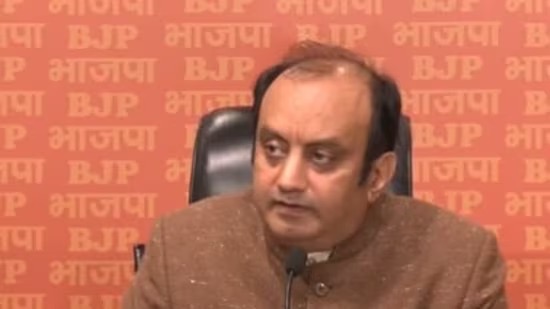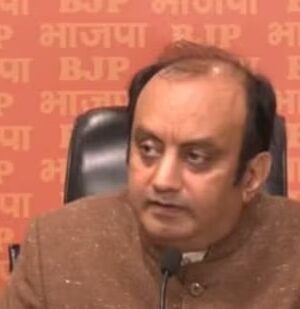In a recent development, the Bharatiya Janata Party (BJP) has strongly criticized the Congress party for declining the invitation to attend the upcoming Ayodhya Ram temple’s ‘Pran Pratishtha’ ceremony scheduled for January 22. The temple consecration event has been dubbed a ‘BJP/RSS event’ by the Congress, leading to a heated exchange between the two political entities.

BJP spokesperson Sudhanshu Trivedi, in a scathing remark, invoked the legacy of India’s first prime minister, Pandit Jawaharlal Nehru. Trivedi stated, “This is Nehru’s Congress, this is not Gandhi’s Congress. Mahatma Gandhi used to sing ‘Raghupati Raghav Raja Ram,’ and today Congress is not attending the ‘pran pratishtha’ ceremony. This shows Congress is against Hindu religion and Hindutva.”
The Congress party, in its refusal to attend the ceremony, labeled it as a ‘BJP/RSS event,’ emphasizing its stance against what it perceives as the politicization of the temple consecration. Prominent leaders such as Mallikarjun Kharge, Sonia Gandhi, and Adhir Ranjan Chowdhury have confirmed their absence from the event.
The invocation of Nehru’s name in the discourse adds a historical dimension to the political disagreement. It highlights the ideological shifts within the Congress party, drawing a distinction between the era of Mahatma Gandhi and Nehru and the present-day Congress. Trivedi’s statement implies that the current Congress leadership diverges from the values associated with Mahatma Gandhi, especially his reverence for ‘Raghupati Raghav Raja Ram.’
The controversy surrounding the Congress’s decision not to participate in the ‘pran pratishtha’ ceremony underscores the deep-seated tensions between the BJP and the Congress on matters related to religion and Hindutva. This disagreement has further intensified the political narrative leading up to the significant event in Ayodhya.
As the political discourse continues to evolve, the invocation of historical figures and the framing of the temple consecration as a symbol of Hindu religion and Hindutva highlight the complex interplay between politics and cultural identity in contemporary Indian politics. The absence of key Congress leaders from the ceremony may have repercussions, both politically and symbolically, as the nation observes this landmark event in Ayodhya.
In a recent development, the Bharatiya Janata Party (BJP) has strongly criticized the Congress party for declining the invitation to attend the upcoming Ayodhya Ram temple’s ‘Pran Pratishtha’ ceremony scheduled for January 22. The temple consecration event has been dubbed a ‘BJP/RSS event’ by the Congress, leading to a heated exchange between the two political entities.
BJP spokesperson Sudhanshu Trivedi, in a scathing remark, invoked the legacy of India’s first prime minister, Pandit Jawaharlal Nehru. Trivedi stated, “This is Nehru’s Congress, this is not Gandhi’s Congress. Mahatma Gandhi used to sing ‘Raghupati Raghav Raja Ram,’ and today Congress is not attending the ‘pran pratishtha’ ceremony. This shows Congress is against Hindu religion and Hindutva.”
The Congress party, in its refusal to attend the ceremony, labeled it as a ‘BJP/RSS event,’ emphasizing its stance against what it perceives as the politicization of the temple consecration. Prominent leaders such as Mallikarjun Kharge, Sonia Gandhi, and Adhir Ranjan Chowdhury have confirmed their absence from the event.
The invocation of Nehru’s name in the discourse adds a historical dimension to the political disagreement. It highlights the ideological shifts within the Congress party, drawing a distinction between the era of Mahatma Gandhi and Nehru and the present-day Congress. Trivedi’s statement implies that the current Congress leadership diverges from the values associated with Mahatma Gandhi, especially his reverence for ‘Raghupati Raghav Raja Ram.’
The controversy surrounding the Congress’s decision not to participate in the ‘pran pratishtha’ ceremony underscores the deep-seated tensions between the BJP and the Congress on matters related to religion and Hindutva. This disagreement has further intensified the political narrative leading up to the significant event in Ayodhya.
As the political discourse continues to evolve, the invocation of historical figures and the framing of the temple consecration as a symbol of Hindu religion and Hindutva highlight the complex interplay between politics and cultural identity in contemporary Indian politics. The absence of key Congress leaders from the ceremony may have repercussions, both politically and symbolically, as the nation observes this landmark event in Ayodhya.










